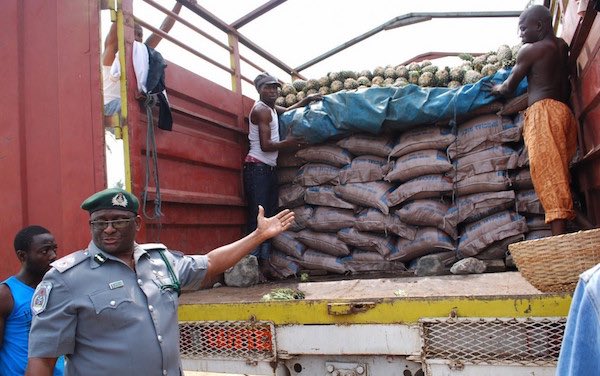In August, the Nigerian government blocked imports of a long list of products from neighboring countries Benin, Niger, and Cameroon—including foods such as live poultry, pork, beef, refined vegetable oils and fats, and sugar, as well as many other items ranging from medications to used cars. West Africa’s economy continues to reel from the effects these border closures, which the government says will last until at least Jan. 31, 2020. The move has also led to an upsurge in smuggling.
Nigeria’s actions cut against the Africa-wide trend toward free trade—and its own commitments. The African Continental Free Trade Area (AfCFTA) entered its operational phase in July. The agreement aims to establish a single African market for goods and services, with countries committing to cutting tariffs by 90% while harmonizing trade rules. The African Union (AU) suggests it will boost intra-African trade by 52.3%. AfCFTA comprises 54 of the AU’s 55 members as signatories—including Nigeria itself, which signed in July after a number of delays.
Nigeria’s actions are part of a longstanding pattern of protectionist policies dating to the mid-1970s. As of 1986, approximately 40% of agricultural and industrial products were covered by import prohibitions. Between 1980 and 1991, affected countries including Benin, Cote d’Ivoire, Norway, and the United States lodged GATT and/or ECOWAS complaints. In response, the World Bank, with the support of the IMF, initiated a trade liberalization program in the mid-1980s to provide technical and policy advice to Nigeria and making loans of $450 million and $500 million. But the taste for protectionism continued.
The Nigerian government claims these policies promote import substitution, boost employment, and improve its balance of payments. The reality is more complex. In fact, import bans and high tariffs protect the vested interest of local players—Nigerian producers and employee unions—while Nigerian consumers suffer from high prices, limited buying choices, and often inadequate quality or availability of key commodities such as foods and drugs.
Unsurprisingly, smuggling has become common. The roads linking Benin to Nigeria are traditionally used by smugglers who take advantage of large gaps in prices on both sides of the border. Benin’s National Institute of Statistics and Economic Analysis (INSAE) has collected data on these informal trade flows since 2011. According to one 2011 survey of 171 border points without customs officers, 17,749 individual illegal transactions took place over 10 days, with a total value of $15.2 million. Illegal trade between Benin and Nigeria represented 2.3-3.8 times the trade officially recorded by customs officials, the survey said.
The case of rice smuggling is emblematic. African countries have developed a strong taste for rice and rely heavily on imports. To reduce that dependency, most have decided to invest in developing local value chains. But in Nigeria, rice production has lagged behind growing demand from the population of 200 million, even with large government subsidies and loans. The Nigerian agriculture sector still suffers from years of neglect, including a lack of investment and reliance on oil to provide foreign exchange and government revenues.
In 2004, Nigeria prohibited of rice imports from Benin, then added more neighboring countries to the ban in 2016, while placing a 70% duty on other foreign rice. In addition, as of 2015, the government has required the use of foreign exchange to import food commodities such as rice.
Meanwhile, in 2014 Benin lowered its tariffs on rice imports from 35% to 7%. (Cameroon removed them completely.) This led to the creation of a conduit for cheap rice imported to Benin and then illegally exported to the Nigerian market.
Benin’s imports of rice from Thailand skyrocketed in 2017 and 2018—far beyond the amount needed to meet demand. At its height, the ratio of imported Thai rice to Benin’s population (11.5 million) was 150 kilograms (330 lb)—a daily per capita consumption of 410 grams (0.9 lbs), without accounting for rice from other sources. By contrast, in 2016 Benin’s total per capita daily rice supply was only half that figure—207 grams, according to FAO statistics. Where did all that extra rice go? Most of the official imports of rice to Benin are evidently smuggled to Nigeria after being repackaged.
Nigeria’s border crisis continues to disrupt African trade relationships and ongoing negotiations. Nigeria has apparently not formally notified its regional partners of its recent restrictions as required by Economic Community of West African States (ECOWAS) trade rules. Thus the border closures contravene an agreement that guarantees free movement between the 15 ECOWAS members. They clearly go against both the letter and the spirit of AfCFTA.
Nigeria is isolated; a majority of African countries are today attracted by trade liberalization and the promise of AfCFTA, particularly continental champions like Morocco and South Africa. Nigeria’s actions suggest that while it has formally endorsed a continental free trade zone, it is not committed to that goal—and may choose to remain behind at a critical moment for the continent.
Antoine Bouët and David Laborde are Senior Research Fellows with IFPRI’s Markets, Trade and Institutions Division (MTID); Fousseini Traoré is an MTID Research Fellow; Swati Malhotra is an MTID Communications Specialist.







